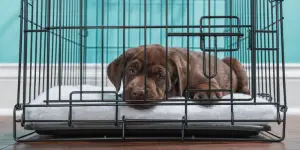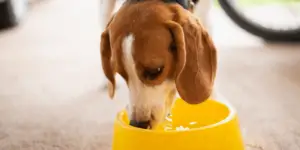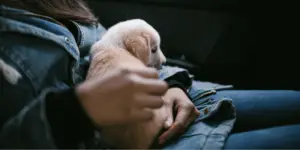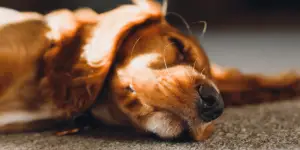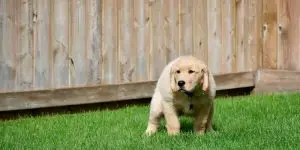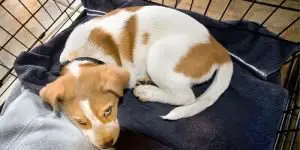
Should puppies have water at night?
- Written by Dr Linda Simon
- Last updated
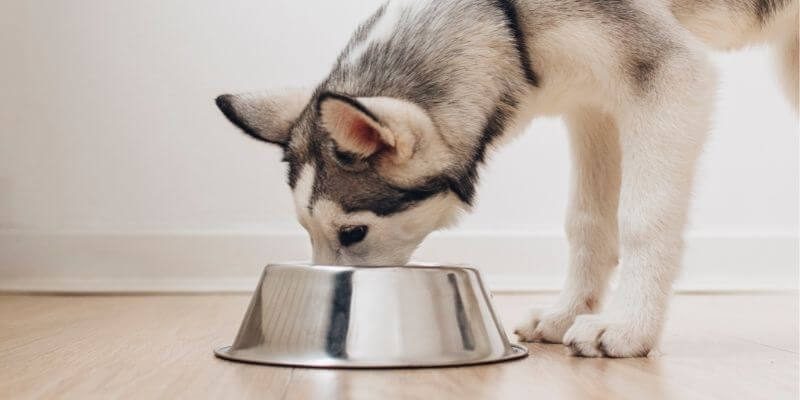
Should puppies have water at night? Key takeaways
- Puppies should have water at night and at all other times. Restricting water, while advised by some, carries real risks.
- It’s advised you leave water in your puppy’s crate overnight. The American Society for the Prevention of Cruelty to Animals backs the UK’s ‘Five freedoms of animal welfare’, one of which stipulates that animals should have ‘ready access to fresh water’.
In this article
Should puppies have water at night?
Yes, puppies should have water at night and at all other times. Restricting water, while advised by some, carries real risks.
As the proud owner of a new pooch, you’ll instinctively want to care for them and do right by them. There can be a lot of things to consider and you will find you have a lot of questions. As a vet, one thing I am often asked by a new owners is if they should restrict their pup’s water access or not.
If your puppy is knocking over their water bowl or urinating inside at night, you may be wondering if you are doing something wrong. This article discusses in detail all about water and your new puppy.
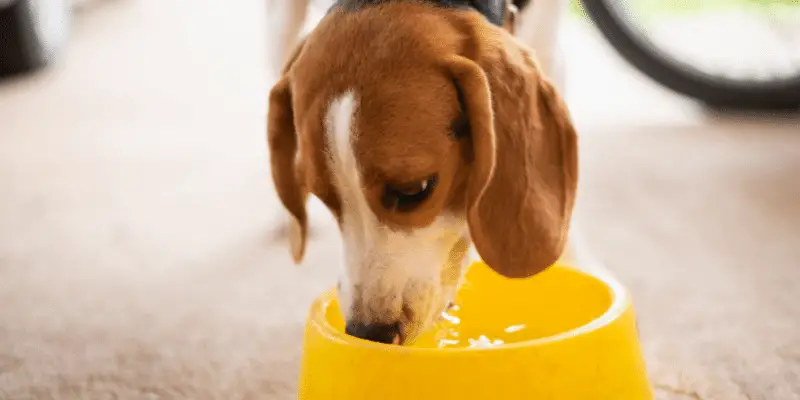
How long can a puppy go without water overnight?
This is an interesting question, and the answer is dependent on a few factors. Most healthy puppies can go about six to eight hours without water without issue.
Those who are small, unwell and young are less able to go without water. So, an eight-week-old Chihuahua with diarrhea cannot go very long at all without water, while a six-month-old, healthy Cocker Spaniel can go quite a bit longer.
While theoretically, a pup can go some hours without water, this is not in their best interest. The longer they go without drinking, the higher their risk of dehydration and health issues. Feeling thirsty, as you’ll know from your own experience, is not a pleasant feeling.
How long can puppies hold their bladder?
A puppy’s ability to hold their bladder depends on their age, size and toilet training. Smaller dogs have smaller bladders so need to pass urine more frequently. At about four months of age, most pups can consistently ‘hold it in’ all night.
Certain breeds are notorious for taking longer to toilet train at night, and these are generally very small breeds with little bladders. Those who take longest include the Maltese, Chihuahua, Yorkshire Terrier and Jack Russell Terrier.
Why not to restrict your puppy’s water
Puppies are built differently to adult dogs and can quickly become dehydrated. They need to drink little and often to prevent this from happening.
If we choose to restrict our puppy’s water access, whether at night or in the morning, we are playing a risky game. While some puppies will drink their daily water requirements during the day, this won’t be true for all of them.
When a young dog eats a dry food diet, they have an even higher water requirement and they may find it hard to meet this during daylight hours alone. While kibble diets are great for oral hygiene and don’t make a lot of mess, they contain very little moisture.
A puppy will have even higher water requirements if they have loose stool or vomiting. An upset stomach is incredibly common at this age and can be linked to parasites, infections and stress. We need to make extra sure our puppy is drinking plenty if they are throwing up or passing more stool than usual.

Ask the Vet - Should I restrict my puppy's water before bed?
"Despite what you may have heard, it is not recommended to withhold water from puppies at night time. Some owners will do this to try and help with toilet training, but limiting water should not really affect toilet training.
Restricting water has no real benefit but it can lead to dehydration, water obsession or urinary tract infections."
- Dr Linda Simon MVB MRCVS
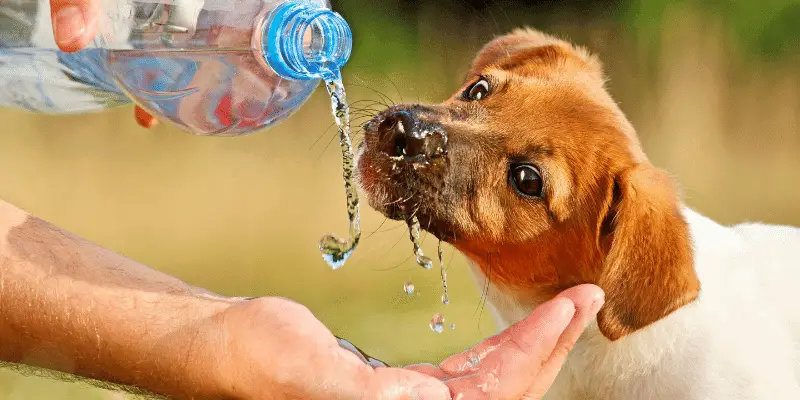
Risks associated with restricting night time water access
As touched on above, there are lots of risks associated with limiting water access. If this is something you are considering doing, make sure you are aware of what could go wrong.
Puppy dehydration
Puppies have a high body surface area to volume ratio, meaning they lose water quickly. For a young or small puppy, dehydration can quickly progress to hypovolaemia (a process similar to shock).
Signs of dehydration include:
• Dry or tacky gums
• Sunken eyes
• Lethargy
• A prolonged skin tent (when the skin is less elastic than it should be)
• A fast heart rate
• Rapid breathing
Water obsession
It stands to reason that if we take water away from our pups, they may crave it and become obsessed with it. Absence makes the heart grow fonder! When the pup is given access to the water they have been wanting, they may obsess over it and worry it will get taken away again.
These youngsters may also start to look for water elsewhere, such as from dirty puddles and toilet bowls. Drinking from these sources puts your bundle of fluff at risk of a stomach upset, bleach ingestion and parasite infestations.
One especially high risk is Leptospirosis. This is a bacterial infection spread by rat urine. Puddles, lakes and other bodies of water are often contaminated. While our puppies should be vaccinated against this life threatening condition, this won’t always guarantee their protection.
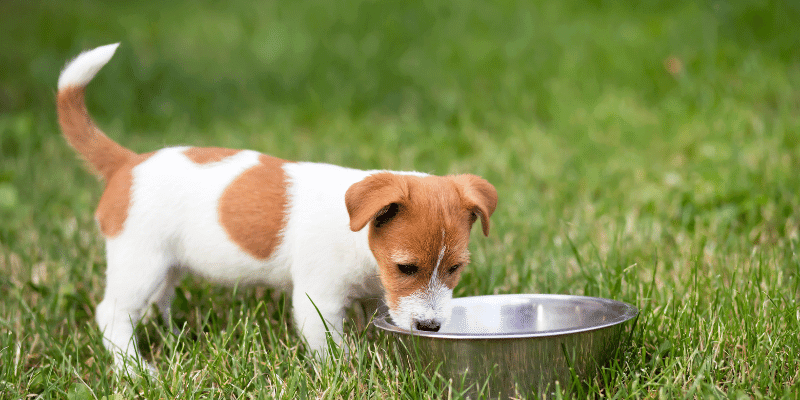
Water resource guarding
When a pup learns their water gets taken away and their access to it is limited, they may take matters into their own ‘paws’. If desperate for the water you are taking away, they might resort to guarding it. This can include snarling, growling and even snapping as you try to take their dish away.
While this behaviour is not appropriate, we can see why a pup would do it. They have a biological need for water and it should be accessible at all times. They see you as a threat to their health and wellbeing if you limit their water access.
This is a sure-fire way of creating a distrustful relationship and you may find your bond with your puppy starts to suffer. If they are letting you know their water is precious to them, you need to listen.
Health repercussions
Water is critical for a puppy’s health. When we limit water intake, we can cause dehydration. Taking in too little water can lead to urine that is too concentrated, which causes urinary crystals and bacterial infections.
If your dog is ‘flushing’ themselves through by drinking plenty, this ensures the kidneys can do their job of filtering the blood. It also means the urine in the bladder does not become too concentrated, which can create a range of health issues.
Should you leave water in your puppy’s crate overnight?
So, should you be leaving water with your pup at all times? In short, the answer is YES! Sure, they may knock the bowl over from time to time but cleaning up mess is part and parcel of owning a fur ball.
One of the ‘Five Freedoms of Animal Welfare’ in the UK is: ‘Freedom from hunger and thirst’. This stipulates that animals should have ‘ready access to fresh water’. This is backed by the American Society for the Prevention of Cruelty to Animals.
When should you stop giving a puppy water at night time?
There are some advocates of limiting water a few hours before bed and even of taking away water at bedtime. The reasoning behind this is that this may reduce nighttime accidents and make toilet training easier.
The truth is, when a pup is properly toilet trained, they do not need us to limit their water access. If you are struggling with pees inside at night, it may be that you need to re-visit toilet training. Do be sure to always bring your pup out just before bed time.
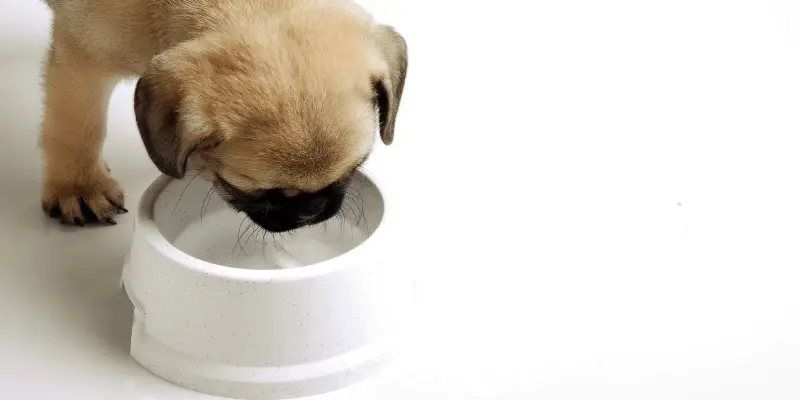
Is it ever okay to remove water access?
As discussed above, I am not an advocate of removing water. The risks out weigh any benefit and we could be doing long term harm.
Remember, a puppy who is well hydrated is not going to be guzzling their water all night long. In fact, they may not even touch it. However, it is important for them to know it is there if needed.
Perhaps the only time I’d consider temporary water removal would be if a pup was consistently knocking their water over and getting soaked. However, even this can be resolved. It may simply mean you need a bigger crate and a more sturdy water bowl.
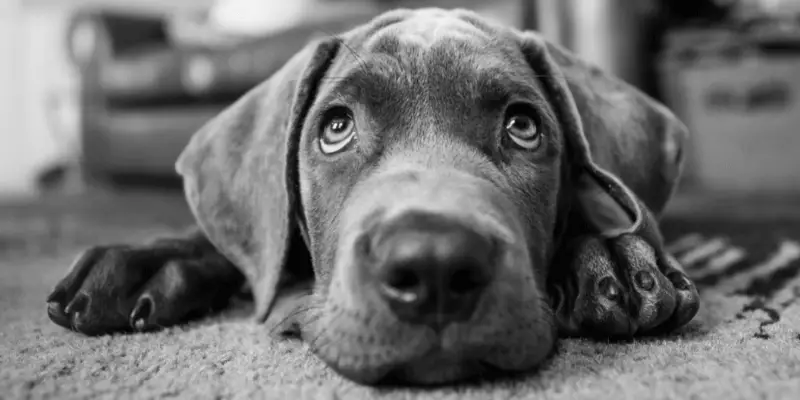
Why is my puppy so thirsty?
The average pup will drink about 80 to 100 ml/kg of water in 24 hours. For a 5kg pup, this means about 400 to 500mls of water spread throughout the day. Remember, as your pup grows, their water requirements increase.
Those on wet food diets will be taking in much of their water in this manner. If your dog is solely eating dry fed, they will spend more time at the water bowl. If concerned they are drinking to excess, measure their water out with a jug at the start and end of each day to calculate what they’re taking in.
If your pup is drinking more than 100mls/kg a day or is suddenly drinking a lot more than before, have a chat with your vet. They may ask you to bring your little guy in for a check-up. As well as the puppy being examined, your vet should analyse their urine.
Possible causes of excessive thirst at this age can include urinary tract infections, congenital kidney disease, ectopic ureters, and diabetes (rarely).
How to prevent night time accidents
The number one best way to prevent nighttime accidents is to be hot on toilet training. Once your dog understands what is needed from them and you have a schedule in place, nighttime accidents will be a thing of the past.
Importantly, never miss the last potty break of the night and don’t leave your pup waiting while you have a lie in in the morning. Your pup needs to know you’re there for them 365 days of the year.
While some experts suggest withholding water to prevent night time soiling, this is not necessary. Or, if it is, that is indicative of an underlying medical issue that needs to be looked into.
Nighttime water schedules for a puppy
While schedules are the key to success, a schedule to withhold water is not needed. A good schedule includes a potty break before you fall asleep (ideally about 10-11pm) and one first thing in the morning (about 6-7am).
As your dog matures, you can increase the amount of time between these potty breaks. This will be a gradual process as your little fluffball grows and learns how to hold their bladder for longer.
If you’re dead set on removing water for some time, ensure it is for the shortest time possible. This would mean from the 10-11pm toilet break to the morning wake up.
Remember, water is especially critical if the weather is warm and if your dog has been exercising a lot during the day. If you’ve noticed your pup has not drunk much during the day, they may have a higher water requirement that night time.
FAQS
While we won’t need to be measuring out our dog’s water for the day, it can be nice to have a rough idea of what our puppy should be taking in. This article provides some excellent information and discusses all you need to know about your puppy’s water needs.
As is true in every walk of life, folks will have different opinions. This is the case even among animal experts! Some vets will suggest taking water up at night, and this is more common in certain parts of the world than in others.
As the owner, it is up to you to make the most informed decision you can. If your vet has advised this but it does not sit right with you, it will certainly not do any harm to allow your puppy 24/7 access to water.
The first consideration is age. We can sometimes expect too much of our little ones, especially in their first few months. A puppy who is less than four months old will usually still need a toilet break in the middle of the night.
If your puppy is soiling indoors at an older age, consider if your toilet training may be to blame. Have you been 100% consistent and dedicated? If not, take a few steps back and start over.
If your puppy is really struggling and is still peeing indoors at night after four months of age, consider a vet visit. It may be that we are dealing with a congenital issue such as an ectopic ureter, or a bacterial urinary tract infection.

Dr Linda Simon
Dr Linda Simon MVB MRCVS is a locum veterinary surgeon who has worked in London for the past 10 years. She graduated top of her class in small animal medicine from UCD, Dublin. She is currently a member of the Royal College of Veterinary Surgeons.

